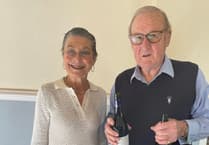MAJOR concerns about the ambulance service’s ability to deal with changes to the way in which stroke patients are treated have been raised by East Hampshire District Council.
It follows the decision to concentrate specialist stroke treatment at Frimley Park Hospital, Camberley, rather than Guildford’s Royal Surrey County Hospital.
The decision affects many East Hampshire residents, who count for 15 per cent of patients now being treated at Frimley Park since staff shortages at RSCH brought about the change in January.
Patient groups in Haslemere have mounted a campaign against the move which leaves two of the NHS’ new hyper acute stroke care units for the region in the north – the other is at Ashford, in Middlesex.
A formal public consultation into the switch ended on April 30, and campaigners fear the Guildford and Waverley Clinical Commissioning Group, which implemented the change, merely wants to rubber-stamp its decision.
In a response to the consultation, councillor Ingrid Thomas, EHDC’s portfolio holder for health and wellbeing, has sought reassurances that the extra time needed to get to specialist facilities at Frimley will benefit patients – and that the ambulance service will be able to respond.
She said: “East Hampshire District Council places the health and well being our residents at the core of everything we do.
“The proposed changes to Royal Surrey County Hospital stroke services, have a potential serious effect on our residents and we have therefore considered carefully the possible solutions to improve access to services.
“We understand and support the need for a hyper acute stroke care unit (HASCU) as it will enable the best outcomes for our residents. The training of staff, and the expertise that is offered enables a better chance of life with less disability, is welcomed.
“Crucially, we have also noted the time taken to treat patients is much faster in a HASCU, because of the number of trained staff and other facilities available which are also on site.
“We also understand Frimley Park is currently in a better position to offer the best treatment for our residents due to problems at Royal Surrey with staffing and facilities.
Mrs Tomas added: “However we do have concerns about the critical time element of stroke treatment.
“We have been told it is crucial for patients who may be suitable for thrombolytic therapy, to be assessed and given the vital injection anywhere between two and four-and-a-half hours from the time of the brain accident. Therefore, I would seek reassurance the ambulance service is committed to this new model, and will have the resources and capacity to be able to deliver against this vital target.
“East Hampshire residents make up 15 per cent of the patients now being treated at Frimley Park – instead of Guildford – and all of them will have had to make a longer, and potentially more difficult journey to the hospital.
“We have been assured this slightly longer journey time will be made up by the faster treatment time once the patient arrives in the HASCU, especially in terms of outcomes for that patient.
Mrs Thomas added: “Our significant concern remains the ambulance service, which is considered by many to be under performing. Response times are far longer than acceptable, journey times may be longer than expected, and all of which delays the time for a patient to be treated.
“We have been told the ambulance service is currently under new directorship and things are anticipated to improve.”
Mrs Thomas is hoping for proposals to formally monitor the 999 service performance – both operationally and strategically – to ensure much needed improvements are actioned.
• Health secretary Jeremy Hunt is also concerned about journey times to the new unit at Frimley.
The Haslemere MP convened a meeting last month to address the concerns raised with Professor Tony Rudd, NHS England clinical director for strokes, and SECAmb chief executive Daren Mochrie.
The stroke ‘summit’ was also attended by borough council leader Julia Potts, Guildford and Waverley Clinical Commisioning Group chairman Dr David Eyre-Brook and borough councillor Robert Knowles.
It was agreed Mr Mochrie would report back with response times of SECAmb – which has been placed in special measures by Mr Hunt – by the end of June, to ensure the service was up to speed.
A second ‘summit’ will be held in July to check SECAmb’s ability to provide a ‘fit for purpose service’ and also to discuss where stroke patients should receive rehabilitation after discharge from Frimley.




Comments
This article has no comments yet. Be the first to leave a comment.